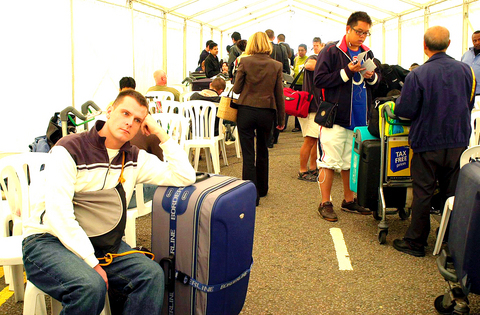Tens of thousands of air travellers faced another day of chaos yesterday after British Airways cancelled all its flights in and out of London's main Heathrow airport because of a wildcat strike.
It cancelled all its British, European and long-haul flights at the world's busiest international airport Thursday after baggage handlers walked out in sympathy with workers at the catering firm that prepares its in-flight meals.
With no immediate end to the dispute in sight, and with 100 aircraft and 1,000 pilots and cabin crew left stranded elsewhere around the world, British Airways said it would remain grounded yesterday.

PHOTO: EPA
"It is a huge disappointment to us that we have become embroiled in someone else's dispute," said British Airway's chief executive Sir Rod Eddington.
British Airways operates some 550 flights a day at Heathrow at this time of year -- traditionally one of the busiest weeks for the airline industry, with legions of holidaymakers taking to the air.
As passengers arrived on Thursday to discover that they had been shut out of Heathrow's terminals, airport staff distributed fold-up chairs and bottles of water, and a race was on to find overnight accomodation for out-of-towners.
The chaos stems from the sacking of 800 workers from Gate Gourmet, an in-flight catering firm owned by a Texas investment group that counts British Airways as its biggest client at Heathrow, west of London.
Gate Gourmet said the layoffs were necessary for its survival, but the Transport and General Workers Union accused management of acting in a "disgraceful" fashion and urged British Airways to put pressure on it.
The dispute escalated sharply Thursday when baggage handlers, members of the same union, staged a spontaneous unofficial strike in support of their Gate Gourmet colleagues.
Besides British Airways, the walkout had a direct impact on Australian carrier Qantas, Finnair and Sri Lankan Airways, which depend on the same baggage handlers at Heathrow.

Intelligence agents have recorded 510,000 instances of “controversial information” being spread online by the Chinese Communist Party (CCP) so far this year, the National Security Bureau (NSB) said in a report yesterday, as it warned of artificial intelligence (AI) being employed to generate destabilizing misinformation. The bureau submitted a written report to the Legislative Yuan in preparation for National Security Bureau Director-General Tsai Ming-yen’s (蔡明彥) appearance before the Foreign Affairs and National Defense Committee today. The CCP has been using cognitive warfare to divide Taiwanese society by commenting on controversial issues such as Taiwan Semiconductor Manufacturing Co’s (TSMC, 台積電) investments in the

INVESTIGATION: The case is the latest instance of a DPP figure being implicated in an espionage network accused of allegedly leaking information to Chinese intelligence Democratic Progressive Party (DPP) member Ho Jen-chieh (何仁傑) was detained and held incommunicado yesterday on suspicion of spying for China during his tenure as assistant to then-minister of foreign affairs Joseph Wu (吳釗燮). The Taipei District Prosecutors’ Office said Ho was implicated during its investigation into alleged spying activities by former Presidential Office consultant Wu Shang-yu (吳尚雨). Prosecutors said there is reason to believe Ho breached the National Security Act (國家安全法) by leaking classified Ministry of Foreign Affairs information to Chinese intelligence. Following interrogation, prosecutors petitioned the Taipei District Court to detain Ho, citing concerns over potential collusion or tampering of evidence. The

‘COMPREHENSIVE PLAN’: Lin Chia-lung said that the government was ready to talk about a variety of issues, including investment in and purchases from the US The National Stabilization Fund (NSF) yesterday announced that it would step in to staunch stock market losses for the ninth time in the nation’s history. An NSF board meeting, originally scheduled for Monday next week, was moved to yesterday after stocks plummeted in the wake of US President Donald Trump’s announcement of 32 percent tariffs on Taiwan on Wednesday last week. Board members voted to support the stock market with the NT$500 billion (US$15.15 billion) fund, with injections of funds to begin as soon as today. The NSF in 2000 injected NT$120 billion to stabilize stocks, the most ever. The lowest amount it

NEGOTIATIONS: Taiwan has good relations with Washington and the outlook for the negotiations looks promising, Minister of Economic Affairs J.W. Kuo said Taiwan’s GDP growth this year is expected to decrease by 0.43 to 1.61 percentage points due to the effects of US tariffs, National Development Council (NDC) Minister Paul Liu (劉鏡清) said at a meeting of the legislature’s Economics Committee in Taipei yesterday, citing a preliminary estimate by a private research institution. Taiwan’s economy would be significantly affected by the 32 percent “reciprocal” tariffs slapped by the US, which took effect yesterday, Liu said, adding that GDP growth could fall below 3 percent and potentially even dip below 2 percent to 1.53 percent this year. The council has commissioned another institution